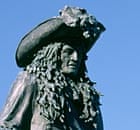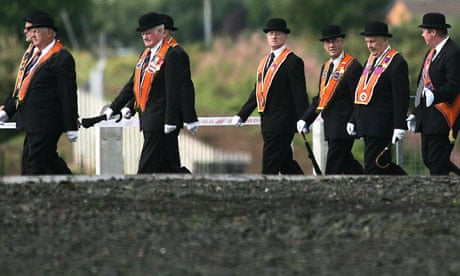Liverpool's connections with the island of Ireland are well-known. It is estimated that three out of every four of its inhabitants have some ancestors from either Northern Ireland or the Republic, earning it the nickname of the 'real capital of Ireland'.
However, it is arguably less well-known that the city has strong ties to both of Northern Ireland's main traditions and is regarded as being the main centre of the Orange Order in England today.
Billy Owens, Provincial Grand Master, says that there are 92 lodges of the order in ten districts in Liverpool, with another 20 in Bootle, which forms a separate province.
The roots of the Orange Order in England go back over 200 years, when it was introduced to Manchester by soldiers returning from Ireland. In the early days, Manchester was the main hub for English Orangeism - orange being the name and colour of the Royal Dutch house of King William III of England, the 'King Billy' of Northern Ireland's troubled history.

Liverpool took then took over the role as England's main centre, with the order having close ties to the Liverpool Protestant Party, which lasted from 1909-74. Manchester plays a role and new lodges have been established recently in Blackburn and Stockport. Both Owens and his deputy, Steve Kingston, say that the order in England today is not, for the most part, linked to migrants from Northern Ireland but that the lodges are mainly English in membership - something reflected at the Liverpool Provincial HQ, where the Cross of St George flies alongside the Union flag.
The growth of the order in the city was generally seen as a reaction to large-scale migration of Catholics from Ireland in the 19th century, and the Liverpool Protestant Party had, at one stage, nine members on the City Council. Owens own father served as a councillor with the party for nine years, until electoral boundary changes affected its base. This was also hit by the demolition of old housing schemes in the inner city, which saw new lodges dispersed to the outskirts.
Asked to summarise what attracts people from Liverpool to join the Orange Order and the associated Ladies' Orange Association, Owens describes the organisation as still about defending the monarchy, preserving the unity of the United Kingdom, and defending Protestantism. He doesn't see the campaign for Scottish independence as a major issue, pointing to opinion polls which indicate that Scotland is likely to stay in the UK.
While historically the Orange Order has tended to lean towards the Conservative Party, Owens points out that Liverpool Orangemen include supporters of all three main parties, and he acknowledges there is little difference today between Labour and the Conservatives in terms of Northern Ireland policy. As for the decline of the Ulster Unionist Party, to which the Order was traditionally linked, he replies that the unionists
shot themselves in the foot by having so many parties, they let Sinn Féin in.
This time of year is, of course, the marching season, and Mr Kingston points out that there are Orange marches in Liverpool most weekends, with major parades on and leading up to July 12. There are also parades for St George's Day, Reformation Sunday and Remembrance Sunday, with local lodges also having their own parades at various weekends.
The major July 12 rally is held each year at Southport, while this year Orangemen are marking both Queen Elizabeth's diamond jubilee and the centenary of the Solemn League and Covenant, associated with Sir Edward Carson. Owens strongly rejects any view that the order is hostile to Roman Catholics.
We believe in civil and religious liberty for everyone. We believe in it for ourselves, but we don't want to interfere in the liberties of Roman Catholics, we all have Roman Catholic neighbours and friends.
He feels that relations between the communities have greatly improved in Liverpool, and says that many of his Roman Catholic neighbours attend bingo sessions at the hall and various other social events. For the order's part, he says that no one objects to the St Patrick's Day parade on 17 March, although there have been tensions about its 'misuse' in the past by IRA supporters.
St Patrick should be seen as the patron of all sections of the Irish population, he says. Some Orange lodges in Northern Ireland are dedicated to the saint's memory and the order holds its own commemoration of St Patrick in Liverpool.
Owens and Kingston were recently in Australia for a meeting of the Imperial Orange Council in Melbourne. Other delegates were from Canada, the US and New Zealand as well as Australia and the UK, but visa problems kept out contingents from Ghana and Togo.
Both West African countries have a 'significant' Orange presence, says Owens, and Liverpool's lodges have attracted members from the Afro-Caribbean community. He says:
We were parading through Toxteth, and some republican sympathisers began telling people in the area that we were from the National Front. But we had 30 or 40 black members in our lodges who explained the real position to them.
The order retains lodges in Dublin and county Wicklow in the Irish republic, as well as in many English cities down to the south coast, as well as Wales where a new one was recently established in Cardiff.

Comments (…)
Sign in or create your Guardian account to join the discussion